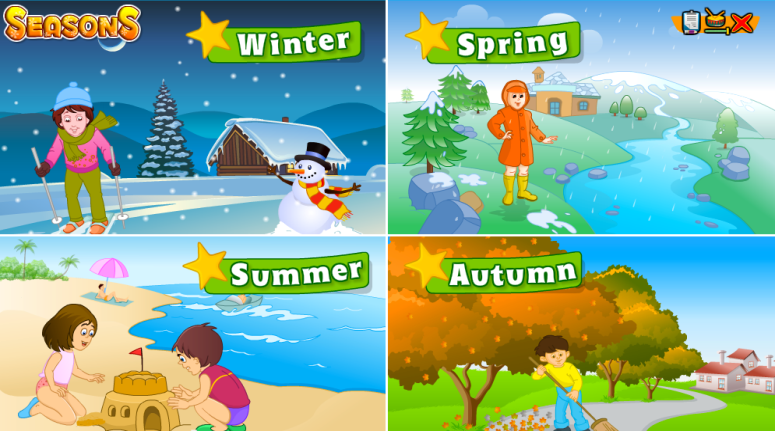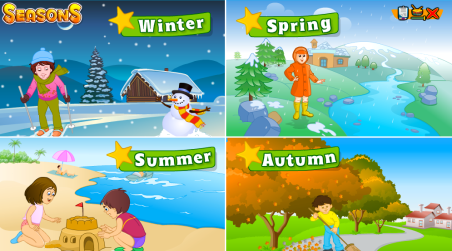- Учителю
- План по англискому языку на тему seasons
План по англискому языку на тему seasons
|
Lesson: Seasons |
School: | |||
|
Date:15.06.2016 |
Teacher name: Nus,Nur,Shek | |||
|
Class: 2nd form |
Number present: |
Absent:- | ||
|
Learning objectives(s) that this lesson is contributing to |
2. L4 , S3 L4. recognize with support short basic questions about what something is S3. Pronouns familiar words and expressions intelligibly
| |||
|
Lesson objectives |
All learners will be able to:
Most learners will be able to: -Respond appropriately to some questions YES \ NO
Some learners will be able to: -to make up four sentences about seasons
| |||
|
Previous learning |
The weather : hot, cold, cool, warm, windy, stormy, sunny
| |||
|
Plan | ||||
|
Planned timings
|
Planned activities (replace the notes below with your planned activities) |
Resources
| ||
|
Start
|
Organization moment - 2 min Divide the class into four groups - 2 min Count from one to four
Warm up -3min Ask the home work - 3 min
What was your home work? What words did we learn the previous lesson?
The new theme summer, autumn, winter, spring, season er [ә], au [o:], w[w] ng[ң], ea[i:],
Seasons
|
Song activities
Slides of pictures | ||
|
Middle
|
Answer the questions: Yes\No - 2 min
2. Fill in the gaps the names of seasons - 2 min It is hot in …. It is cold … It is cool… It is sunny… It is warm…
3. Look at the pictures and make up 4 sentences. -3 min
|
Interactive board
| ||
|
End
|
|
| ||
Cross-curricular links
Health and safety check ICT links
Values links
Reflection
Were the lesson objectives/learning objectives realistic?
What did the learners learn today?
What was the learning atmosphere like?
Did my planned differentiation work well?
Did I stick to timings?
What changes did I make from my plan and why?
Summary evaluation
What two things went really well (consider both teaching and learning)
What two things would have improved the lesson (consider both teaching and learning)
What have I learned from this lesson about the class or individuals that will inform my next lesson?
</<br>
Short term plan
Lesson plan
Before beginning, refer to your medium term plan. Your lesson plans should be developed from this,
making any adjustments necessary in the light of recent teaching and learning.
LESSON: Unit 7 Food and Drink: Animals
like…
School:
Date: Teacher name:
CLASS: Number present: absent:
Learning objectives(s) that
this lesson is contributing
to
1.S5 1.L3 1.S1 1.L3 1.UE9
Lesson objectives All learners will be able to:
Say names of some animals intelligibly
Say names of some food items intelligibly
Produce some approval/disapproval sounds
Most learners will be able to:
Understand some factual questions about animals and their food
Respond appropriately to some yes/no questions
Use some short form answers correctly
Respond to some information questions about animals correctly
Some learners will be able to:
Produce a simple food chain and narrate to class what eats what
Use present simple forms correctly in narration
Previous learning plural 's' forms, irregular plurals: sheep fish mice; personal pronoun
they present simple forms: eat, like; short forms: do
Plan
Planned
timings
Planned activities (replace the notes below with your
planned activities)
Resources
8-12 minutes
12-15 minutes
Teacher models and drills words that feature in animal food
chains. Teacher shows a word and then drills pronunciation
with individual learners then whole class. Teacher then
flashes cards and nominates individual learners to produce
words.
Teacher demonstrates what learners have to do with a
model question. Teacher then reads out each question
about animal food e.g. Do cats like milk? Do cows eat eggs?
repeating each question twice and learners answer y or n on
their answer sheet. In feedback Teacher encourages
learners to answer Yes they do/No they don't.
Flashcards for words
grass, fish,
bananas, milk,
leaves, birds, bugs
etc.
Worksheet:
numbers 1 -10 with y
for yes and n for no
written against each
number
A set of 10 questions
to read out
Middle
15 -20
minutes
Divide the class into three teams for an animal food quiz.
Ask a question and show visual of animal: What do spiders
like/eat?
A set of animal
visuals / flashcards to
project50
Version 5
December 2014
15-20
minutes
Keep team scores. Score one point for first correct answer
and a bonus point if the team can name a second thing.
In groups of 3-5, Teacher gives a worksheet with an outline
diagram of a food chain and another worksheet with images
of animals and food for learners to cut out and stick into their
food chain. The images of animals show how they can be
made as animal shadow shapes. Learners make food
chains with support from Teacher.
food chain outline
worksheet
Worksheet with
animal food images
to cut out [images
include visual of how
to make animal
shadow shapes]
20-25
minutes
Learners practice and get ready to perform their short
narrative about their food chain. Learners make animal/ food
shadow shapes on board, make animal noises / approval /
disapproval noises …yuk etc. and say what animals like or eat,
e.g. Bugs like leaves / Birds [bird noise] eat bugs [yuk] .and
Cats like birds. Give different learners in groups different roles:
narrator, shadow puppet makers, noise makers etc. Let
learners practice stories before telling the whole class.
Blank projection
screen for learners to
make animal shadow
shapes on
Additional information
Differentiation - how do you
plan to give more support?
How do you plan to challenge
the more able learners?
Assessment - how are you
planning to check learners'
learning?
Cross-curricular links
Health and safety check
ICT links
Values links
more support can be given
during elicitation, instruction and
questioning phases of the lesson
by nominating learners to
answer items relating to more
high frequency vocabulary to
build confidence through
participation.
more able learners will be
challenged by prompting their
groups to develop more
elaborate food chains to narrate.
through questioning and the
redirecting of questioning in
feedback activities
through observation in group and
end performance activities
performance arts: making of
animal shadow puppets as part
of a story
environmental science: animal
food chains51
Version 5
December 2014
Reflection
Were the lesson
objectives/learning
objectives realistic?
What did the
learners learn
today?
What was the
learning atmosphere
like?
Did my planned
differentiation work
well?
Did I stick to
timings? What
changes did I make
from my plan and
why?
Use the space below to reflect on your lesson. Answer the most relevant
questions from the box on the left about your lesson.
Summary evaluation
What two things went really well (consider both teaching and learning)?
1:
2:
What two things would have improved the lesson (consider both teaching and learning)?
1:
2:
What have I learned from this lesson about the class or individuals that will inform my next lesson?Куни: 16.05.2016 Текширдим:
Синфи: 5-«Д»синф
Мавзу: Мехнат бахт келтирар
Мақсади:
-
Уқувчиларни эринмасдан мехнат қилишга ургатиш
-
Олган билимларини амалда қуллаш малакасини хосил қилиш
-
Уқувчиларни мехнатпарварликка тарбиялаш
Жихози: Расмлар, китоблар
1.Кириш қисми
Мехнатдан келса бойлик-турмуш булар чиройлик. Қадим замонлардан одамлар мехнат қилиб кун кечирганлар. Бизнинг хаетимизнинг асосини мехнат ташкил қилади. Мехнатсиз биз яшай олмаймиз. Уқувчиларнинг дарс тайерлаши, куп китоб уқиши бу ақлий мехнатга киради, жисмоний тарбияда, бадан тарбиясида биз жисмоний мехнат қилган буламиз. Ақлий ва жисмоний мехнатни биз бирга олиб боришимиз керак. Чунки жисмоний мехнатнинг одам хаетида урни катта. Жисмоний мехнат соғлом булишга ердам беради. Хар бир уқувчи жисмоний ва ақлий мехнатни бажариши керак шундагина биз соғлом була оламиз. Мехнат қилсан курасан рохат дейдилар чунки мехнат қилмай бир муваффақиятга эришиш қийин.
2. Уқувчилар билан суроқ жавоб утказиш
А) Мехнат хақида қандай мақоллар биласиз
Б) Мехнатнинг фойдасини айтинг
В) Мехнатсиз хаетингизни фараз қила оласизми?
Г) Одам соғлом булиши учун нима қилиши керак?
-
Якуни

